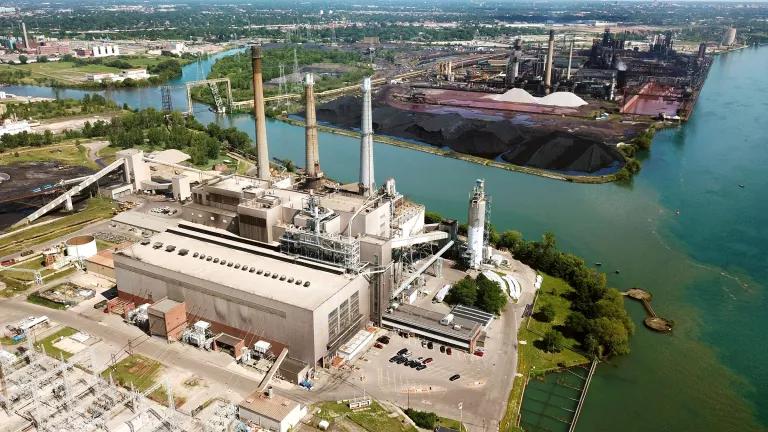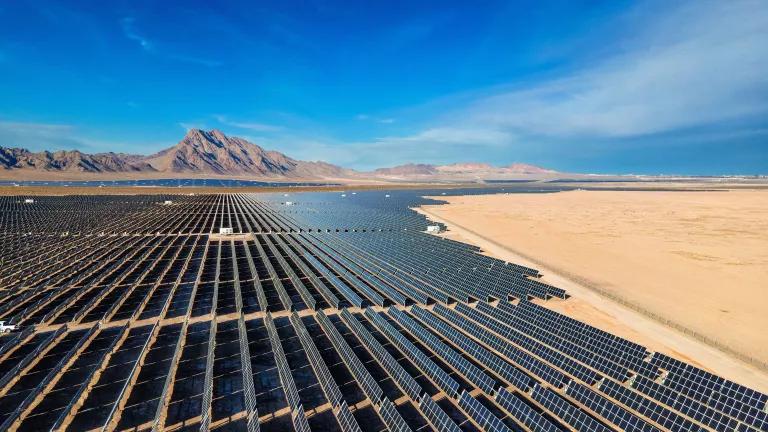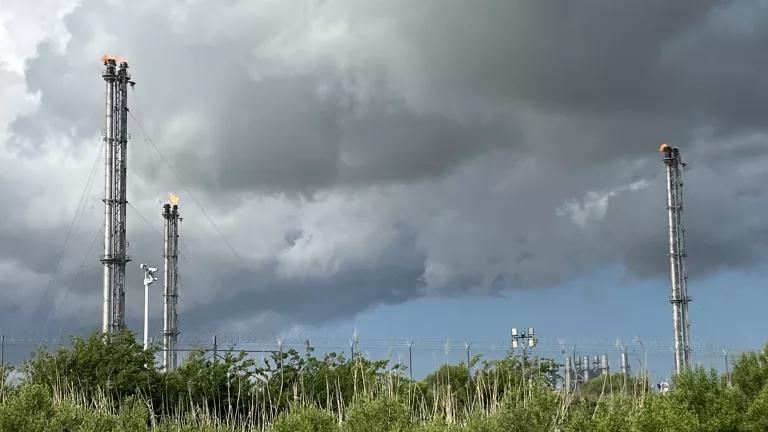The Days of Fossil Fuel Freebies Are Over
To rapidly transition to a clean energy economy, we need to take back trillions in government subsidies and other giveaways that boost the oil, gas, and coal industries.

The coal-fired DTE River Rouge Power Plant—and a U.S. Steel plant with slag piles on adjacent Zug Island—where the River Rouge spills into the Detroit River in Michigan.
This Earth Day, millions of people around the globe are taking a really important action: calling for a rapid phaseout of fossil fuels to help us reduce climate pollution and transition instead to a clean energy economy. To do that, we need to take back trillions in government subsidies and other giveaways that boost the oil, gas, and coal industries. Asking taxpayers to use their hard-earned dollars to fund wealthy fossil fuel companies makes no sense. Letting fossil fuel companies benefit from loopholes in environmental laws saves them money while harming our communities and natural areas. We need the fossil fuel industry to cover the costs of its pollution and the climate change it continues to fuel. And we need industry to invest in a just and equitable transition for workers and communities when it closes out drilling and other activities, instead of foisting this series of burdens onto the country’s most vulnerable.
Our government provides all sorts of free passes to the fossil fuel industry. This happens despite, or maybe because of, the industry’s wealth and power. And it happens without regard to the pollution the industry generates that destroys people’s health, beloved natural areas, and our climate. Tax loopholes and other government giveaways pump billions into fossil fuel companies every year. President Biden’s recently released Made in America Tax Plan estimates that cutting just a few of these subsidies will save the American taxpayers $35 billion in the next decade. Special provisions in the U.S. tax code, for instance, allow fossil fuel companies to write off much of the cost of drilling an oil or gas well, and billions are provided by the U.S. Export-Import Bank and International Development Finance Corporation to fund fossil fuel projects abroad. In addition, the U.S. Bureau of Land Management provides an enormous financial break to oil and gas companies through very favorable leasing rates of public lands it oversees. Leases in these areas can often be bought for the minimum bid of $2 per acre, regardless of what these lands are worth to the public for other uses.1
The fossil fuel industry also enjoys special exemptions from several laws and standards that protect public health, safety, and nature. For instance, the Clean Air Act requires most industries to treat separate parts of a facility in one area as a single polluting entity. This protects the public from all the pollution the facility generates. Oil and gas companies, however, do not have to add up all the pollution they generate from numerous individual wells they may control in the same area. That means that oil and gas wells in and near communities across the country are exempted from safety measures that the Clean Air Act requires. Similarly, oil, gas and coal companies enjoy dozens of other exemptions under the Safe Drinking Water Act, Clean Water Act, Resource Conservation and Recovery Act (RCRA), Comprehensive Environmental Response, Compensation, and Liability Act (CERCLA), and the U.S. National Environmental Policy Act (NEPA). We can not and should not give polluters this leeway.
Finally, the fossil fuel industry enjoys trillions in additional subsidies by foisting the costs of the health problems and climate disasters its products and operations generate onto communities and other business. For instance, the industry does not pay for the economic impact and health costs of increased asthma and cancer rates and decreased life expectancy that its supply chain causes. Nor does it compensate residents for noise pollution, decreased property values, and deterioration of property linked to its facilities. And often, the communities that bear the cost are Black, Indigenous, and people of color (BIPOC) communities that are at an economic disadvantage. In addition, the industry often leaves communities and taxpayers stuck with the costs of cleaning up facilities the industry abandons. For instance, it will require approximately $500 million to safely decommission all the declining oil and gas wells in California. In Colorado, it is estimated that oil and gas companies hold only 5 percent of the bonds necessary to plug spent oil and gas wells. Finally, as fossil fuel facilities (such as coal plants) close, workers lose jobs and they, their families, and entire communities suffer. The fossil fuel industry has long been virtually off the hook for ensuring communities and workers are able to transition to a post–fossil fuel economy in a fair and equitable manner.
To end these fossil fuel polluter giveaways, federal policymakers should immediately:
- Remove tax credits, tax breaks, tax refunds, and other government funding and financial assistance for the fossil fuel industry and major industrial users;
- Remove all loopholes in environmental and other public interest laws and regulations for the fossil fuel industry;
- Require the fossil fuel industry to pay for the damage it does to health, natural areas, and the climate through financial and regulatory mechanisms, such as risk bonds and contributions to funds set up in advance;
- Require the fossil fuel industry to pay the costs of fairly and equitably transitioning communities and workers to a post–fossil fuel economy.
There is a lot of momentum to eliminate fossil fuel subsidies and giveaways. President Biden’s American Jobs Plan asks Congress to eliminate all fossil fuel subsidies in the tax code. The President’s Made in America Tax Plan also notes potential taxpayer savings of $35 billion over 10 years by cutting just a few of these tax code giveaways.
Representative Ro Khanna (CA-17) will chair an Earth Day House Oversight Committee Hearing on Thursday to focus attention on a raft of additional subsidies that the fossil fuel industry enjoys, and the disproportionate burden these subsidies impose on BIPOC communities. Several pieces of legislation in both the House and Senate also aim to cut dozens of subsidies.
This spotlight is encouraging and comes not a moment too soon. Fossil fuel pollution threatens the planet and its people. The days of asking the public, communities, and other businesses to fund this destruction are over.
1. A 2015 analysis of federal oil and gas leasing in seven western states found that 25 percent of the acreage was leased at the minimum bid. Center for Western Priorities, “2015 Public Lands Oil and Gas Leasing Tracker,” westernpriorities.org/lease tracker/. See also GAO, GAO-09-74: “Oil and Gas Leasing: Interior Could Do More to Encourage Diligent Development” (October 2008), which found that states and private parties use strategies, such as swiftly escalating rental rates and varying lease terms, to reflect the likelihood of finding oil and gas.





